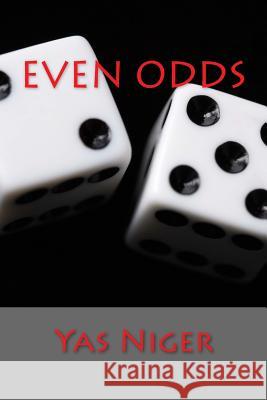Even Odds » książka
Even Odds
ISBN-13: 9781507512098 / Angielski / Miękka / 2015 / 60 str.
This is both a play and a continuous poem. It is a tragedy with only two visible characters in its entirety. There is NE, a young disposed prince out to reclaim his family's seized throne, and BI; his much younger sister and only sibling, who got tangled up in NE's struggles. The orphaned pair's dialogue unfolds the age old tale of belittled feminism and the over-hyped masculinity of the world that habitually swallows up all the laudable efforts of the women folk. The story emerges from their fast paced rhythmic exchanges within a small portion of a single day. Shrouded therein is the mischievous hypocritical malice of the many ordinary people surrounding the few notables ones and it all comes out as though it is true for everyone else, notable and ordinary folks alike. The struggles of people on the spot appears endless as everyone around them seems to wait to hear about their travails, desirous of finding out if they win their battles or not, if their wars can be classed as successful or disasters. People simply relish jeering at others when they fail and leer at them when they are triumphant. This is a tale that seemingly reassures that justice tends to resurrect subsequently, and put everything correct again. It is a poem that places destiny in both the hands of the particular individual and still puts fate in the unclear whirl and thrill of luck. Set in the embattled order of seemingly medieval times, when life ironically felt less secured despite being certainly very sure. The play asks more of the right questions than it gives the wrong answers. The siblings' revealed experiences in the play, by extension hints of how everyone else appears to be at the mercy of chance, and yet living out a predestined order of events. Life feels unsafe because sometimes it turns out to vaguely be one instead of the assumed another or the expected other. It is odious to manage the simplest things and people can not really mend the silly holes of doubt they endlessly tend. Dubious questions appear to be posed for readied answers and answers altered to snugly suit unassailable queries, as simple people continuously seek to even the odds life naturally throws at them. These answers appear to lurk in some exact and obscure faith, either or neither conventional or unorthodox. Still the logic of it does not fill the rational gaps that abound in ordinary human life, they simply confuse it farther.
Zawartość książki może nie spełniać oczekiwań – reklamacje nie obejmują treści, która mogła nie być redakcyjnie ani merytorycznie opracowana.











